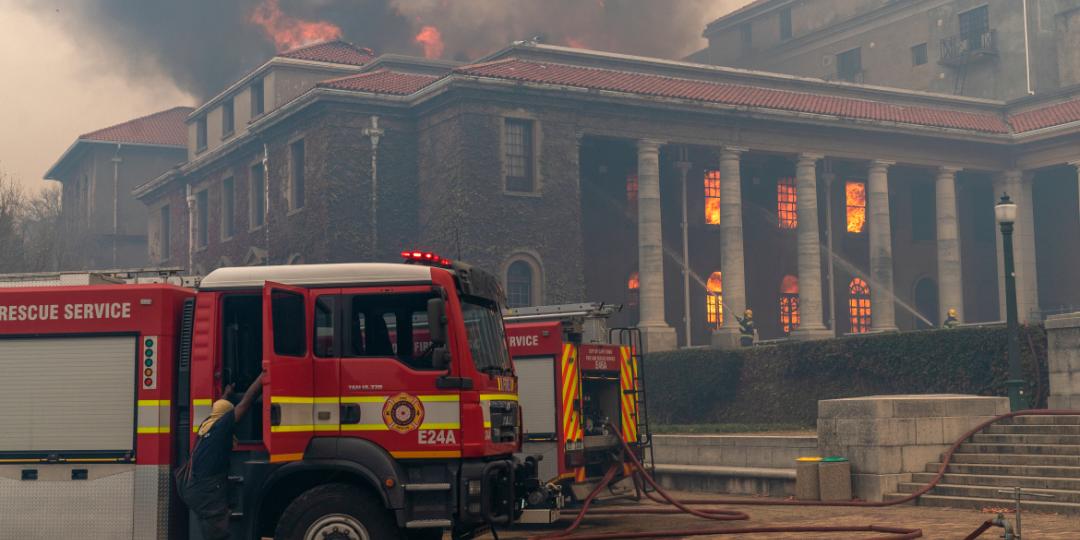An independent fire report on the wildfire – that burned about 600 hectares of land within the Table Mountain National Park and some neighbouring properties on April 18 – has ruled out natural causes such as rockfalls or lightning strikes or an accidental/negligent incident such as an abandoned camping/cooking fire, as possible causes of the fire.
Acting Chief Executive Officer for South African National Parks (SANParks) Dr Luthando Dziba, said during a press briefing yesterday that this therefore confirmed the fact that the fire was not started by homeless persons as was initially alleged.
He noted that various potential causes of the fire were thoroughly assessed by an independent investigator – Enviro Wildfire (Pty) Ltd. “The investigation report provides compelling evidence suggesting that the fire may have been started as a malicious act. This evidence is currently being investigated by law enforcement agencies,” said Dziba.
The report said, according to CCTV footage and eyewitnesses, the fire started at approximately 08h40 under extreme weather conditions such as very warm temperatures (26°C) and low relative humidity (19%). Within a few hours the temperature had increased to 34°C and the relative humidity had decreased to 13 %, with a prevailing north-westerly breeze of approximately 12 km/h.
These conditions, in addition to dry vegetation, presented an ideal environment for the rapid spread of the fire due to the high fire danger index. In turn, the increase in wind speed and a change in the wind direction caused embers to land outside the burn area where they ignited the surrounding veld.
Dziba added that the situation could have been much worse if the strategic relationship between SANParks and various stakeholders, including the City of Cape Town Metropolitan Municipality, had not been in place. “This provided for a well organised effort in suppressing the fire from the ground and air-support within reasonably good time.”
The firefighting team consisted of SANParks, NCC Environmental Services (Pty) Ltd, City of Cape Town, Working on Fire, Volunteers Wildfire Services and the South African National Defence Force.
Five fire-fighters were injured while fighting the fire. “These men and women acted in the best interest of the community despite the extremely grim weather conditions and did so at risk to their own welfare and safety,” said Dziba.
Extensive damage occurred to the Rhodes Memorial restaurant, University of Cape Town (UCT) and the historic Mostert Mill and various private properties as a result of windblown smouldering embers landing in and on dry combustible materials such as thatch, exotic pines, palm trees, ivy and leaves in gutters.
Key take-outs from the fire investigation report:
- On Sunday morning April 18, 2021, at approximately 08h40, a fire originated on Table Mountain National Park (TMNP) property in the area known as Hospital Bend, close to Philip Kgosana Drive.
- The weather conditions, as confirmed by weather data, CCTV camera footage and eyewitness accounts were a calm/very light breeze (the smoke was going straight up), the air being warm and dry, and these conditions prevailed until approximately 10h00.
- Due to the unusually and extremely dry conditions (the humidity dropped to below 15%) smouldering embers in the warm smoke column started to fall outside the burn area from about 10h15 when the wind increased in speed and changed to a north-westerly direction. These embers caused new fires to start over a wide area.
- The TMNP was, and continues to be, a member of the local fire protection association (Cape Peninsula Fire Protection Association). TMNP complied with the legal requirements of the National Veld and Forest Fire Act including aspects pertaining to the preparation and maintenance of firebreaks, as well as the readiness for firefighting and actions to fight fires.
- The clearing and eradication of alien vegetation within the TMNP is an ongoing task. Over the past 36 months, approximately 620 ha have been cleared in the area where the fire occurred and an amount of R5.1m (€XXX) has been spent since 2011. This is in addition to the approximately R63m (€XXX) that has been spent over the past four years in other parts of the Park.
- The TMNP has an active fuel reduction and ecological burning programme that is implemented upon the approval of burning permits issued by the City of Cape Town.























